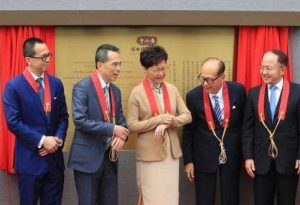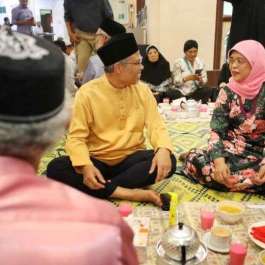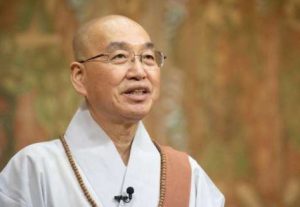
The Tibetan Nuns Project, a US-registered charity based in Seattle and in the Kangra district of Himachal Pradesh, India, has announced that its Geshema Endowment Fund, which empowers Tibetan Buddhist nuns to become geshemas and to work as teachers, monastic and social leaders, and community role models, has so far raised US$16,000 out of a targeted US$100,000, which will be channeled toward helping Tibetan nuns on their path to higher education.
“The Geshema Endowment Fund will help cover the costs involved in training and qualifying more geshemas,” the Tibetan Nuns Project explained. “This includes the costs of travel, food, and accommodation for the geshema candidates to attend the exams. The fund will also cover the cost of administration and materials for the exams, including hosting meetings, couriering exam materials, and providing each new geshema with a set of nuns’ robes and yellow hat that signifies the holding of the degree.” (The Tibetan Nuns Project)
Geshe (feminine: geshema) is an academic degree for Tibetan monastics roughly equivalent to a doctorate in Buddhist philosophy. The geshema degree was only recently made available to Buddhist nuns.* The annual geshema examination has been held only since 2013—until 2011, the geshe title was awarded only to monks. Nuns who successfully pass the degree are qualified to take on leadership roles in their monastic and lay communities that were previously reserved for males. To date, 44 nuns have successfully qualified to hold the geshema title.
The geshema degree represents the highest form of academic training in the Gelugpa school of Tibetan Buddhism. At the conclusion of their 17-year course of study, the nuns must successfully complete a four-year series of examinations in order to attain the degree. The examinations, generally held each year in late summer, take place over a one-month period. Exams this year are scheduled to begin on 1 October.
Candidates for the geshema degree are examined on the entirety of their 17-year course of study of the five great canonical texts. They must achieve a score at least 75 per cent during their studies to be eligible to sit for the geshema exams. On 22 December 2016, His Holiness the Dalai Lama, who has long advocated a geshema program for nuns, awarded 20 Tibetan Buddhist nuns with geshema degrees at a graduation ceremony held at Drepung Monastery in Mundgod, India.**
“The nuns have growing confidence to take on leadership roles,” the Tibetan Nuns Project said of the success of the program in a recent interview. “Before, when the nuns didn’t know anything, when they hadn’t studied and they could barely read or write, they had no confidence. There was no way they could serve in these roles or as role models in their community. That has now changed. People see these nuns who are able to debate as well as the monks, who can hold their own in those kinds of contests, who exude this body language of confidence, who are also prepared to take on leadership roles. This has broadened the base out of potential leaders in the community from only one gender to both genders.” (The Tibetan Nuns Project)

The geshe/geshema qualification is emphasized primarily by the Gelugpa lineage of Vajrayana Buddhism, but is also awarded in the Sakyapa school. The title geshe was first bestowed upon masters of the Kadampa tradition, such as Geshe Chekawa Yeshe Dorje (1102–76). The first modern-day female monastic to qualify for the geshema title was German nun Kelsang Wangmo, who was ordained in India and spent 21 years in training before receiving the Geshema title in 2011.
“The goal of the Tibetan Nuns Project has always been to give the nuns access to education. It is a given, that in a modern world, you need education and a basic understanding to function well in modern society,” the Tibetan Nuns Project remarked. “In addition, it is limiting to push nuns toward the meditative retreat side of things. It is important to give nuns the same access that monks have to the philosophical, the conceptual understanding of their tradition. This means not just studying abstract philosophy; it is understanding the nature of reality so that you can apply that in your meditation to attain levels of realization. Our primary motivation was to open up to the nuns those levels for spiritual progress. But, additionally, they needed education simply to be able to manage their monastic institutions themselves, rather than relying always on male direction.” (The Tibetan Nuns Project)
The Tibetan Nuns Project provides education and humanitarian aid to refugee nuns from Tibet and Himalayan regions of India. Established under the auspices of the Tibetan Women’s Association and the Department of Religion and Culture of the Central Tibetan Administration, it supports hundreds of nuns from all Tibetan Buddhist lineages living in nunneries and elsewhere in India. Many of the nuns are refugees from Tibet, but the organization also reaches out to the Himalayan border areas of India where women and girls have had little access to education and religious training.
For more information on the Geshema Endowment Fund and ways to support the work of the Tibetan Nuns Project, click here.
* The Central Tibetan Administration reached this unanimous and historic decision on 19 May 2012 after a two-day meeting in Dharamsala attended by high-ranking lamas, representatives of nuns from six nunneries, and members of the Tibetan Nuns Project.
** Dalai Lama Awards Historic Geshema Degrees to 20 Nuns and Twenty Tibetan Nuns Make History by Passing Geshema Degree (Buddhistdoor Global)
See more
Tibetan Nuns Project
Geshema Endowment Fund (Tibetan Nuns Project)
Related news reports from Buddhistdoor Global
Bhutan Nuns Foundation Announces Opening of the Training & Resource Center for Buddhist Nuns
51 Tibetan Buddhist Nuns Take Geshema Exams
In Historic First, Two Tibetan Buddhist Nuns Hired to Teach Buddhist Philosophy
Dalai Lama Awards Historic Geshema Degrees to 20 Nuns
His Holiness the Dalai Lama to Award Historic Geshema Degrees Next Week
Twenty Tibetan Nuns Make History by Passing Geshema Degree
Annual Geshema Examinations Held in Dharamsala
Nuns in Dharamsala Participate in Winter Debate before the Dalai Lama
Related features from Buddhistdoor Global
My Journey Toward Sowa Rigpa – The Science of Healing
Khenmo Konchog Nyima Drolma: Serving the Dharma and Sowing the Seeds of Monasticism in the West
Exclusive Interview: The 17th Karmapa and the Buddhist Nuns of the Tibetan tradition
Beauty and the Feminine Buddhist Spirit in Spiti














